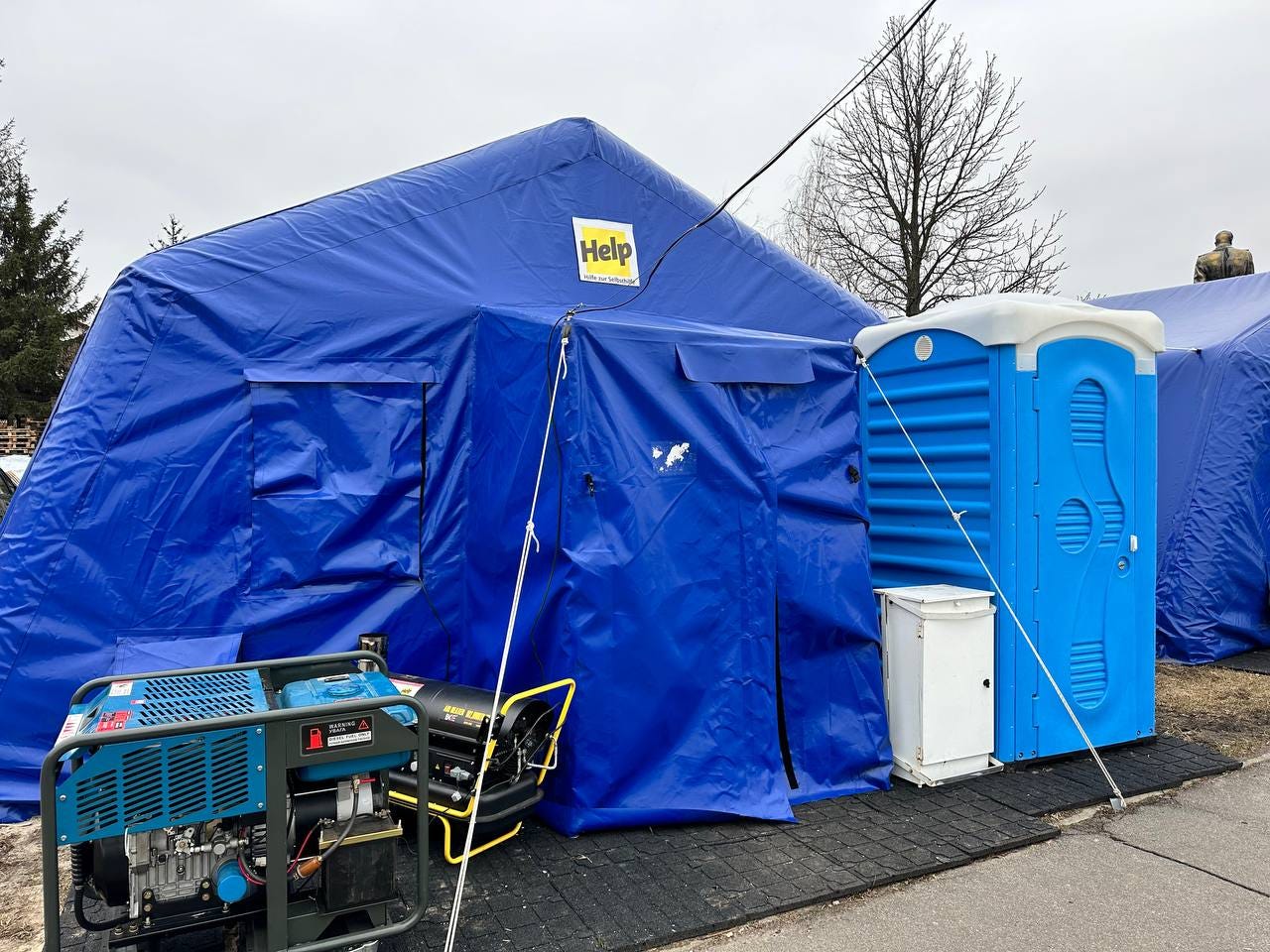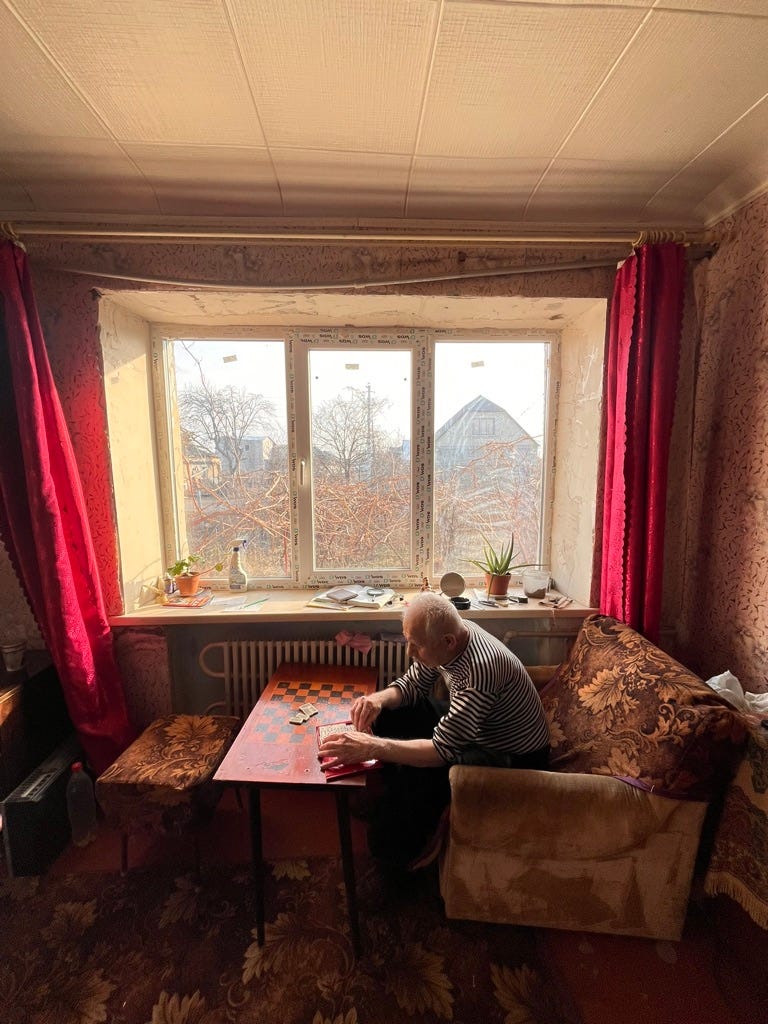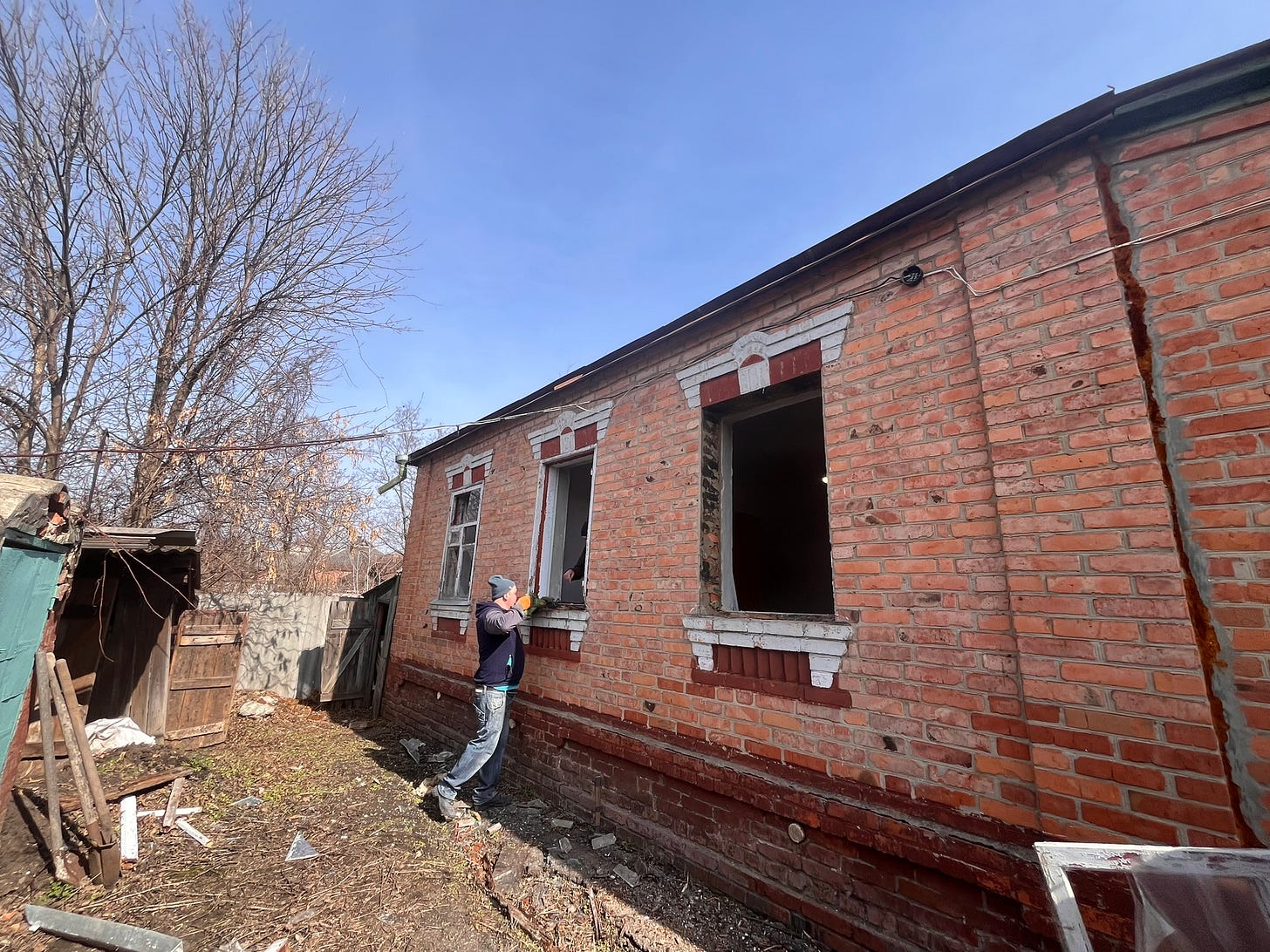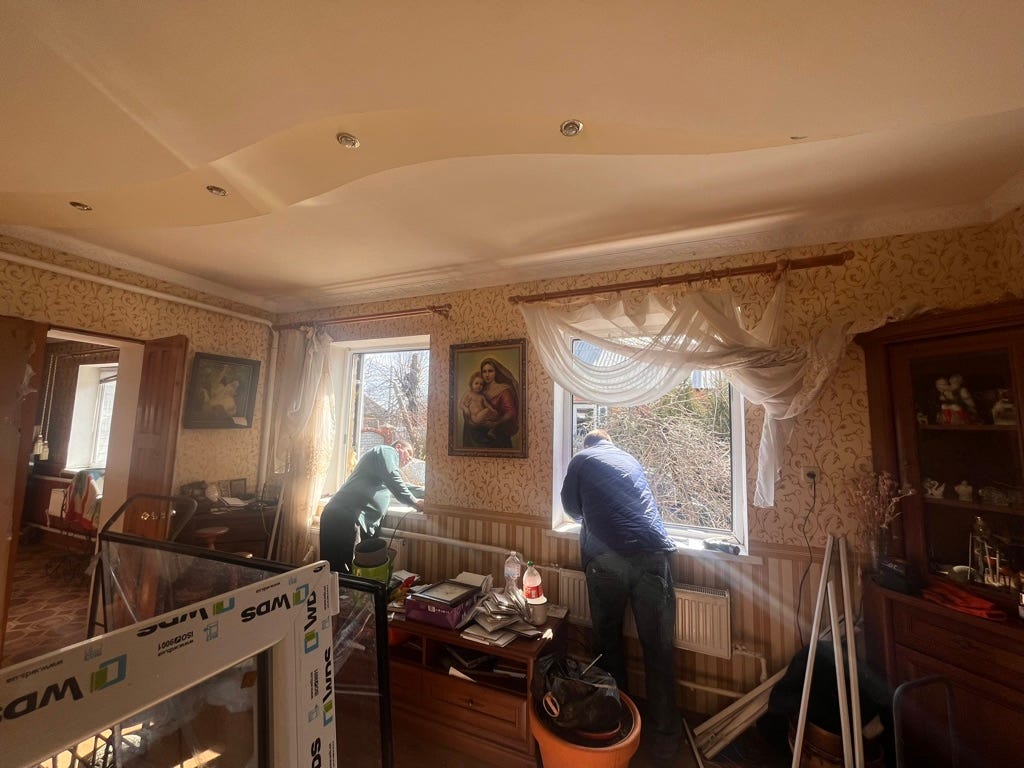I’m writing this newsletter in a makeshift children’s centre in Tsyrkuny, a town just east of Kharkiv where we have been doing repair work for over a year. However, today I am not here to check on our repair works. Instead, I’ve come to use the Starlink we bought for them last year and continue to pay for, which is incidentally being powered by a generator we also provided. Early this morning (Friday 22nd March), Russia launched a massive attack on Kharkiv’s energy infrastructure, sending around 20 rockets at the city. Consequently, there is no electricity or internet connectivity anywhere to be found, either in the city itself or in the surrounding villages where we work, with the exception of those places lucky enough to have generators and Starlinks. This bulletin is predominantly about our rebuilding work, but I thought it worth noting quite how significant the continued impact of our energy support is. Five villages currently use our Starlinks, and we pay £85 per month for each of them. This means that even after attacks like this one, these villages each have a building with free internet for residents to use for free. Right now, I can hear a remote English lesson going on in the room next to me, whilst administration workers have come to sit on beanbags in what is normally a play room, using the electricity provided by our generators and the internet powered by our Starlink. On the other side of the village, a a medical tent was hosting a GP surgery, again with electricity powered by one of our generators. If you would like to contribute to the monthly costs of the Starlinks, please consider donating today.
The medical tent powered by our generator.
The reason I came to Kharkiv this week was to go round the houses from our last order, in Tsupivka, Prudianka, Slatyne, and Rus’ki Tyshky, as well as took look around the houses which make up our next order, which is focussed only on Slatyne. Most of this time was spent talking to the recipients of our support, and hearing their stories, a couple of which I will share here.
In Slatyne, I met Oksana, who lives on the last house on Vulytsia Myra – literally, Peace Street – with her teenage son, Artem. It is effectively the last house in Slatyne. To either side fields stretch out. Before the full-scale invasion, her long-term partner lived with them. Her daughter, Anna, and son-in-law lived two villages north, in Tsupivka. Her son-in-law worked as a border guard. When the full-scale invasion began, the family scattered. Oksana’s partner joined the army; Oksana and her son fled to Italy; Oksana’s daughter and her husband became trapped in Tsupivka, which was occupied,
One day, armed Russian men came to their door, having been tipped off about Anna’s husband’s work. They claimed they were coming to ‘evacuate them’ to Russia, since Tsupivka was being heavily shelled. Anna and her husband tried to refuse, but ultimately were forced to cross the border into Russia. When there, they were separated. Anna is not sure if her husband has been killed or imprisoned, but she has not heard from him in two years. She made her way back through Belarus to Ukraine alone, and now lives in Kharkiv.
Meanwhile, whilst Oksana and her son were in Italy, she got a call to say that her partner had been injured. A local church raised the money to get her a ticket back to Ukraine, where she arrived in time to see him before he ultimately died. War widows are entitled to compensation in Ukraine, however since they were not officially married, Oksana has not received anything. Before the war, Oksana worked on a farm as a fruit picker in the summers, and as a secretary in Kharkiv in the winters. The farm where she worked has been mined, whilst the firm in Kharkiv has been closed, the director having fled the country. So, her and Artem live alone, in the last house, without windows or even a working front door. We measured their windows this week, and, so long as the infrastructure attacks subside, will be able to install their windows and door by mid-April. It’s a small comfort compared to the hell they’ve lived through, but it’s something. The repairs will cost £450.
I also went to visit Olga and Volodymyr, an elderly couple whose homes we repaired in our last batch. Olga and Volodymyr were both born in Slatyne, and have lived in their small apartment there together for over fifty years. In their eighties and childless, they were evacuated to a village south of Kharkiv, away from the fighting, two years ago. There, they were provided with a small cottage to live in. Without a car and with limited mobility to make a day trip there and back, they were unable to return to their apartment at any point to survey the damage. A neighbour called them one day and informed them that their windows had been blown out and offered to board them up. Olga and Volodymyr had little hope at this point of ever been able to return home; their combined pensions of under £100 per month wouldn’t even make a dent in the cost of repairs needed. Both had accepted the high likelihood that they would never see their home again.
We have now repaired all the windows in their apartment, and they have moved home. Both are very unwell. Mine and Olga’s conversation was regularly interrupted by her coughing fits, and Volodymyr had a mini-stroke whilst they were living in the other village, which has weakened him significantly. The war has taken its toll on people’s health across Ukraine, and especially in areas such as this, where rates of heart attacks, strokes, and cancer are sky-rocketing. Nonetheless, that they are now able to be in their own home is a huge relief for both of them. I asked if they had considered staying in the free cottage to the south of the city, since the danger of further attacks there is so much lower, and they looked at me like I was insane. ‘Home is home’, Olga said. Repairs on their apartment cost £400.
Volodymyr playing dominoes under a window we provided.
When one thinks of a refugee, generally one thinks of someone who has moved countries, from danger to safety. The reality is that most refugees are internally displaced, often just moving from one village to another. This week, we installed windows in a house in Prudianka. The residents of the house – a mother, father, and son – have lived in Germany for two years now, and have no immediate plans to return, since the school in Prudianka is completely destroyed.
In the house now live the father’s parents, Anna and Serhii. Up until last week, they have been living in Kozacha Lopan, the last Ukrainian village before the border with Russia, which endured six months of occupation until September 2022 and has been shelled pretty much every day since. As of last week, the Russians have also started pounding it with aerial bombs. We don’t provide repairs there, since the situation remains far too unstable and any windows we installed would be unlikely to last more than a few weeks. Anna and Serhii’s house was badly damaged there a few weeks ago, and so they ultimately decided to move to their son’s family house. There, they will at least have some peace, even if still surrounded by destruction. They will be close enough to Kozacha Lopan to be able to plant their vegetable garden in the next few weeks, but able to sleep somewhere not under active shelling. It also ensures that their son’s family will have somewhere to come back to, if and when they may choose to return. The repairs cost £780.
Replacing windows in Prudianka.
Our last order averaged at £531 per house for repairs, consisting of windows and some front doors. Our next order of 16 homes in Slatyne averages at closer to £560 per home, as it includes houses with a larger amount of damage. Maybe this seems like a lot, but when put into perspective looking at the impact we are having, not just on individual lives but on communities as a whole, it is a small price to pay. In Slatyne, with the exception of the homes which are fully destroyed and there is no hope of people being able to return to them, there are now only fourty houses left without windows. We hope that, with your help, within the next few months we will be able to complete repairs on all of these. Attacks on Kharkiv are increasing again, but our villages thankfully remain quiet, despite the issues with electricity and phone signal these attacks cause. More than ever, the hope that repairs can provide is essential to keeping these communities going through the darkest times.
Thank you all for sticking with us, and thank you especially to all of our supporters who send us month donations. The stability of these is a large part of what enables us to keep going. As we move into spring, we want to be able to ramp up our efforts, but we can only do this with your help. Please keep giving and sharing our work.
PS. Filmmaker Johnathan Duran joined us in Kharkiv Oblast last month and shot some wonderful footage of the villages where we work, which is now being edited into a series of short videos, included the below about Slatyne, and our decision to focus on a small number of villages.








Ada you continue to record the wonderful work that KHARPP delivers with great determination and poignancy. Thank you for all your leadership M
The precision of your targeting must occasionally feel constricting but you’re surely right that the bonus of community rebuilding is a priceless extra. Thank goodness for Starlink. So admire KHARPP